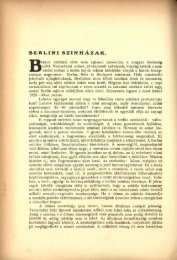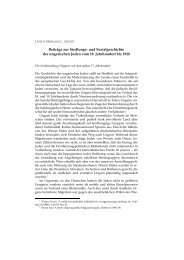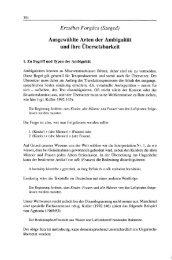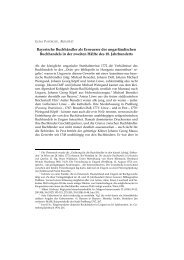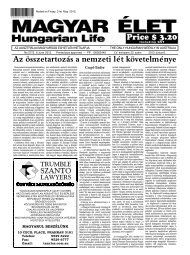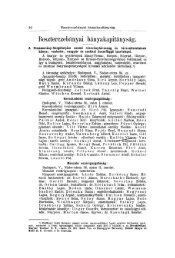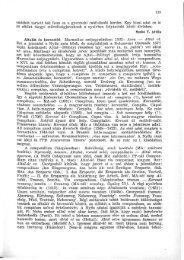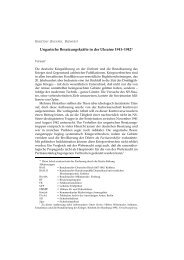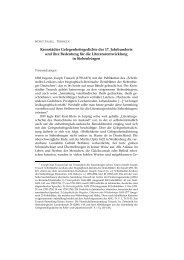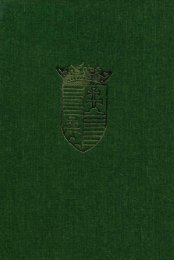Journal of Eurasian Studies - EPA
Journal of Eurasian Studies - EPA
Journal of Eurasian Studies - EPA
Create successful ePaper yourself
Turn your PDF publications into a flip-book with our unique Google optimized e-Paper software.
July‐September 2010 JOURNAL OF EURASIAN STUDIES Volume II., Issue 3.<br />
_____________________________________________________________________________________<br />
were exempted from this act. The Hungarian language became a compulsory subject <strong>of</strong> instruction in<br />
1792 (see act VII. 1792). But in primary and secondary education <strong>of</strong> the other Lands <strong>of</strong> the Hungarian<br />
Holy Crown <strong>of</strong> Saint Stephen this happened only 52 years later (see, act II. 1844 § 8). The municipal<br />
authorities were still allowed to correspond in Latin six years after the Hungarian language had become<br />
the <strong>of</strong>ficial state language in 1844. However the series <strong>of</strong> language laws declaring the Hungarian language<br />
the <strong>of</strong>ficial language <strong>of</strong> the state were only a few years operative. After the crushing <strong>of</strong> the anti‐Hapsburg<br />
Hungarian Revolution and War <strong>of</strong> Independence <strong>of</strong> 1848/1849 Hungarian legislation and the Diet itself<br />
were abolished.<br />
In the first half <strong>of</strong> the nineteenth century the traditional social stratification <strong>of</strong> the Hungarian kingdom<br />
became less relevant and the concept <strong>of</strong> the nation was embraced by the different ethnic groups <strong>of</strong> the<br />
Hungarian kingdom. Instead <strong>of</strong> manipulating the social classes the Hapsburg rulers <strong>of</strong> Hungary started<br />
now to play <strong>of</strong>f the different ethnic “nationalities” against each other in order to maintain control over the<br />
Hungarian kingdom. The Hapsburgs had employed this strategy with much success already in the<br />
Austrian parts <strong>of</strong> the Empire. In the Hungarian part, one <strong>of</strong> the first successful cases <strong>of</strong> Austrian “ethnic<br />
divide and rule” was the Hungarian Revolution and War <strong>of</strong> Independence <strong>of</strong> 1848‐1849. 8 Vienna<br />
organized the Serb, Croat and Romanian forces in order to crush the Hungarian ambitions for a more<br />
democratic and independent Hungary. These engineered antagonisms between Hungarians and non‐<br />
Hungarians formed the roots <strong>of</strong> the ethnic conflicts between these groups. The hierarchies between the<br />
ethnic groups were sometimes reversed. In the period <strong>of</strong> dualism after the Compromise <strong>of</strong> 1867, for<br />
example, the Hungarians became the primus inter pares when the Viennese Court and the representatives<br />
<strong>of</strong> the Hungarian nobility divided power in the framework <strong>of</strong> the Dual Monarchy. The non‐Hungarian<br />
nationalities <strong>of</strong> the Hungarian kingdom had to accept Hungarian supremacy in the Transleithanian<br />
parts. 9<br />
After the crushing <strong>of</strong> the Hungarian Revolution and War <strong>of</strong> Independence <strong>of</strong> 1848‐1849 by the<br />
Austrian forces with help <strong>of</strong> the Tsarist army the ambitions for a restoration <strong>of</strong> Hungarian autonomy<br />
within the Austrian empire were frustrated for a few decades. The Hungarians were harshly punished by<br />
the Austrian government for their rebellion. Thirteen <strong>of</strong> their leading generals were executed at Arad and<br />
martial act was imposed on the country. Vienna appointed an Austrian governor, Alexander Bach<br />
representing the king whot ruled and Germanized the country with a rod <strong>of</strong> iron. Bach had even the<br />
intention to Germanize the language <strong>of</strong> communication <strong>of</strong> the Hungarian Academy <strong>of</strong> Sciences. A<br />
desperate Count Széchenyi wrote even a letter <strong>of</strong> protest in exile in 1858 against the plans to Germanize<br />
the Hungarian Academy <strong>of</strong> Sciences. 10 During the so‐called Bach‐era the Hungarians moved into passive<br />
resistance. Both camps, the House <strong>of</strong> Hapsburg and the Hungarians led by the aristocracy were willing to<br />
conclude a compromise in 1867, however. For Austria a compromise with Hungary became urgent<br />
because Prussia had defeated Austria in 1866 and because Austria was excluded from the German<br />
Customs Union that was dominated by Prussia. The Hapsburgs were looking to the East <strong>of</strong> their Empire<br />
for compensating the loss <strong>of</strong> power in the West.<br />
8 Bideleux, Robert and Ian Jeffries (1998).<br />
9 Bogdan (1989, 113‐126).<br />
10 See Marácz (1996, 67).<br />
_____________________________________________________________________________________<br />
© Copyright Mikes International 2001‐2010 30



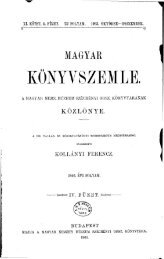
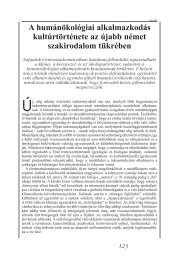
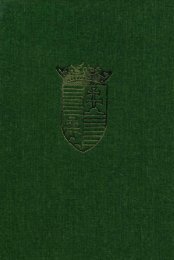
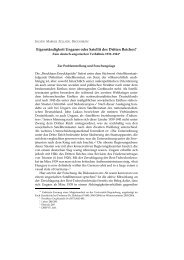
![Letöltés egy fájlban [36.8 MB - PDF] - EPA](https://img.yumpu.com/23369116/1/172x260/letoltes-egy-fajlban-368-mb-pdf-epa.jpg?quality=85)
